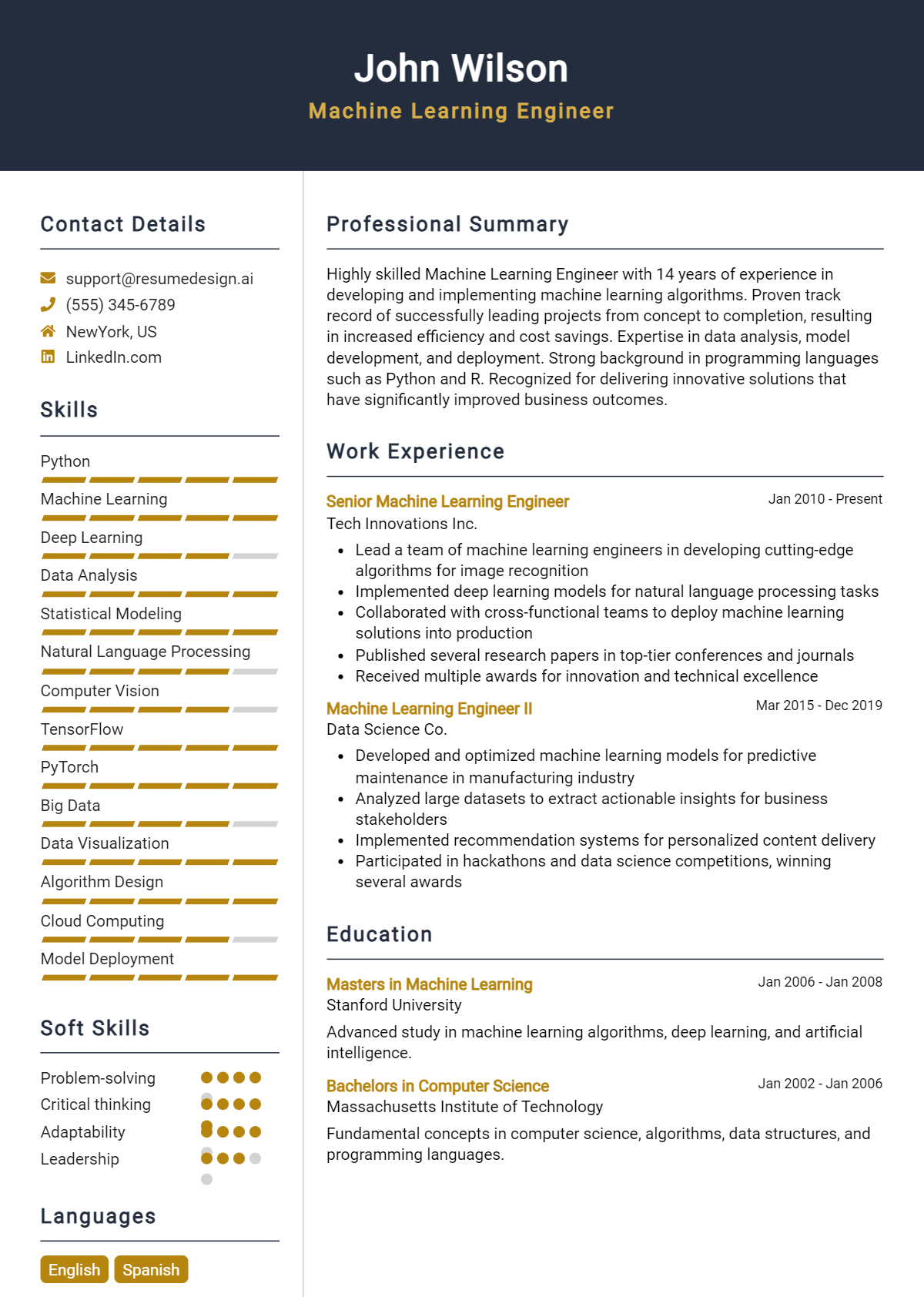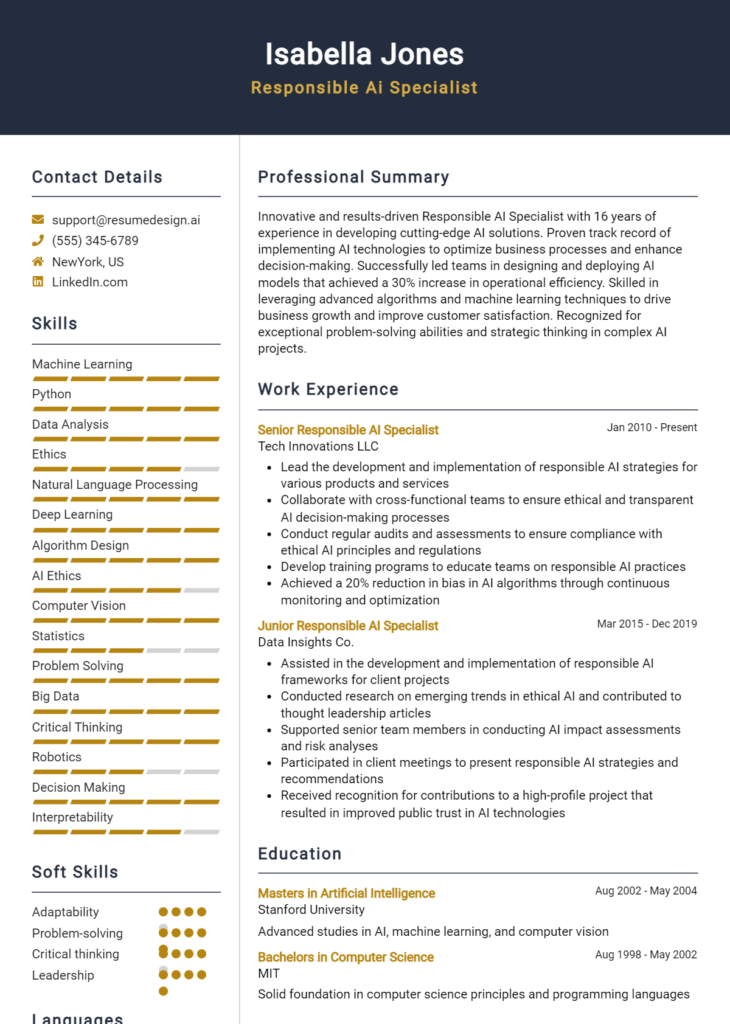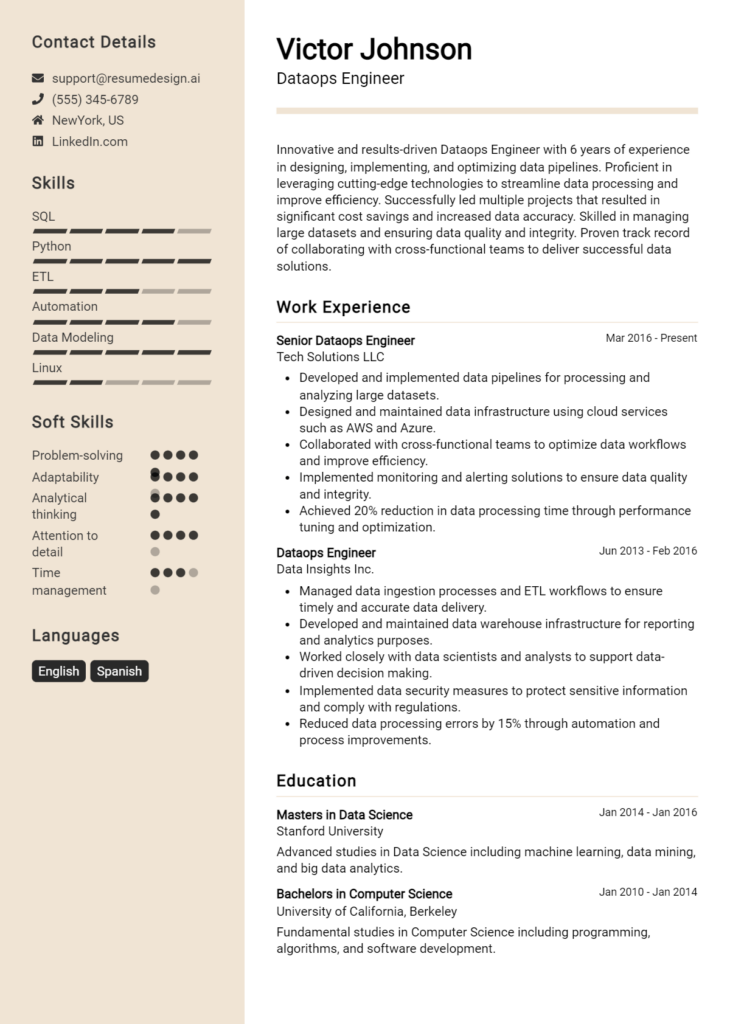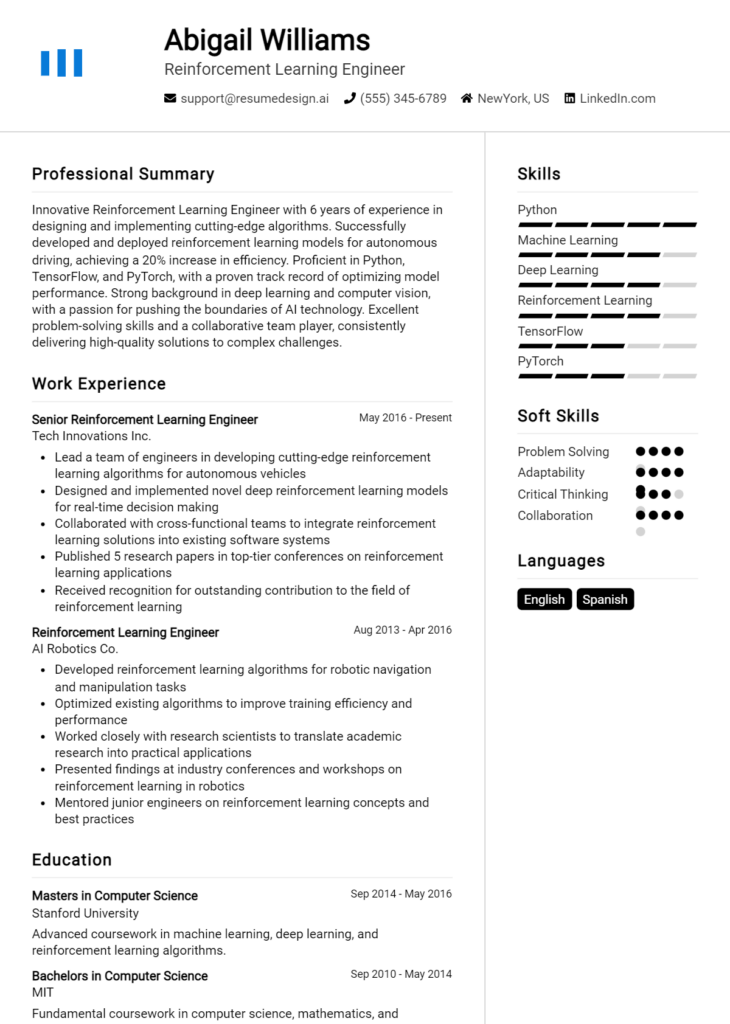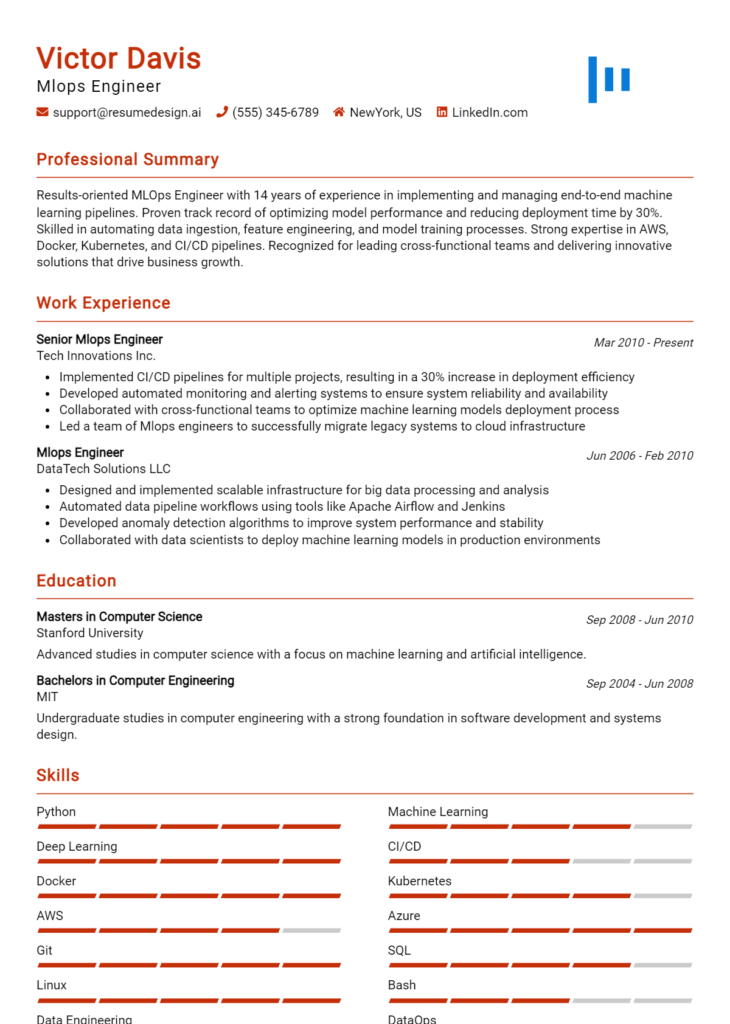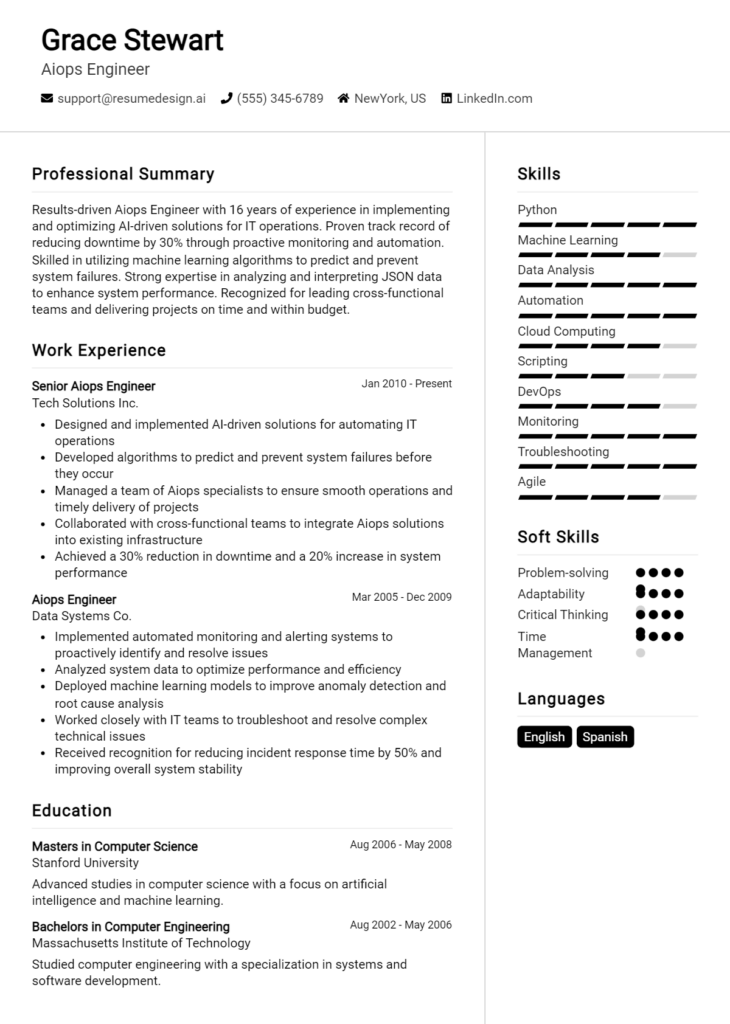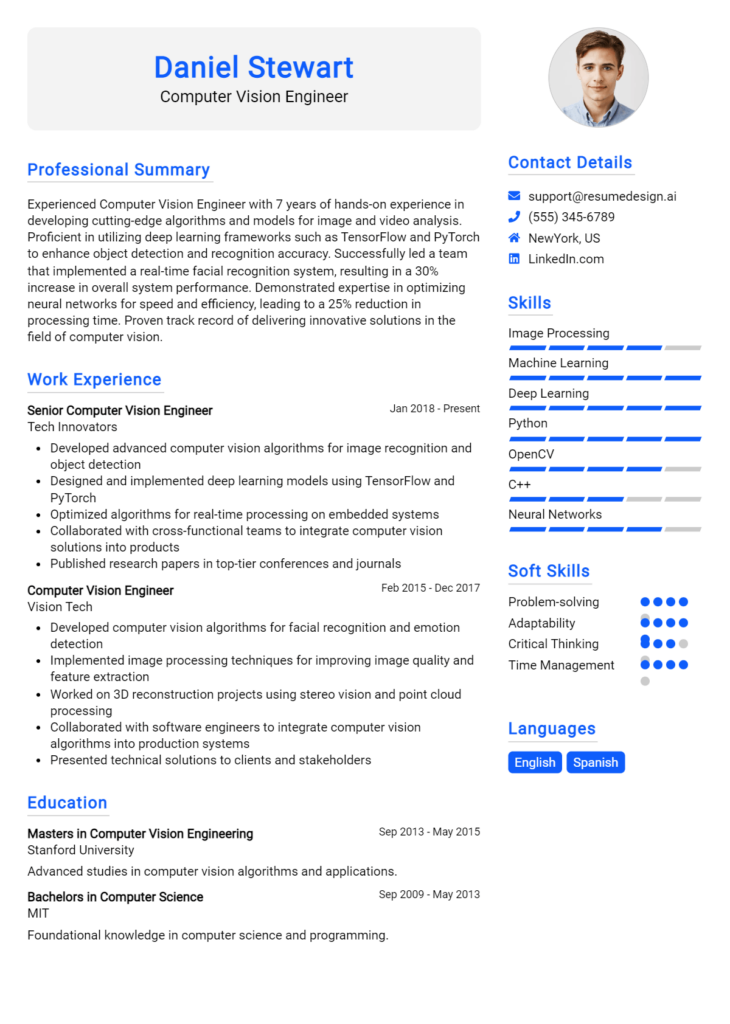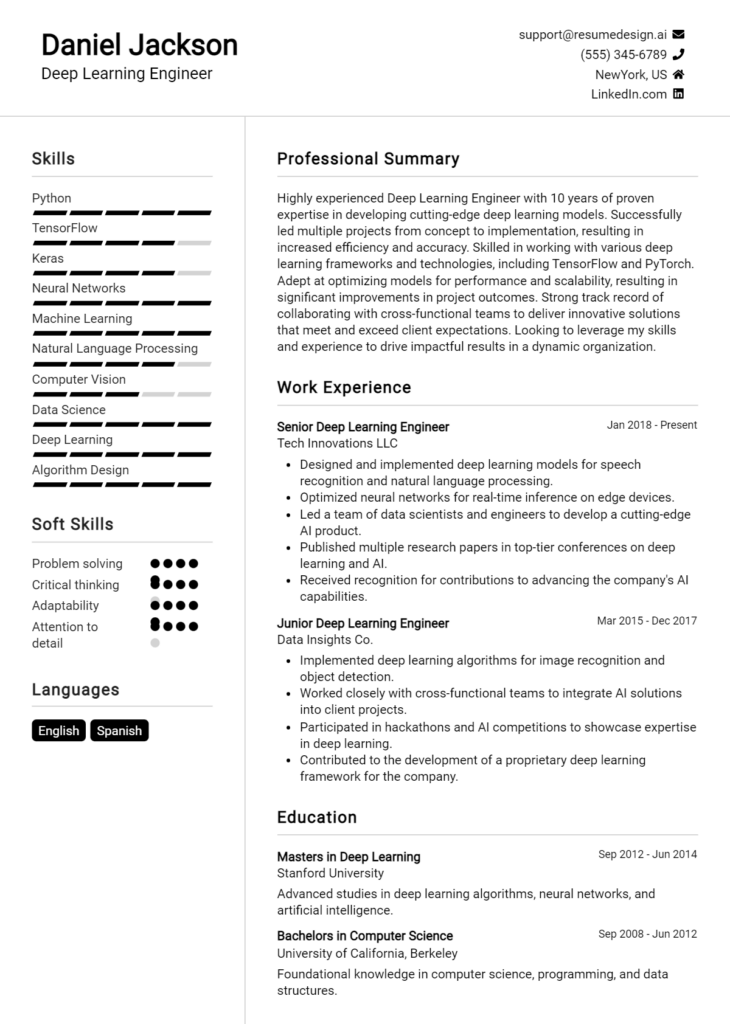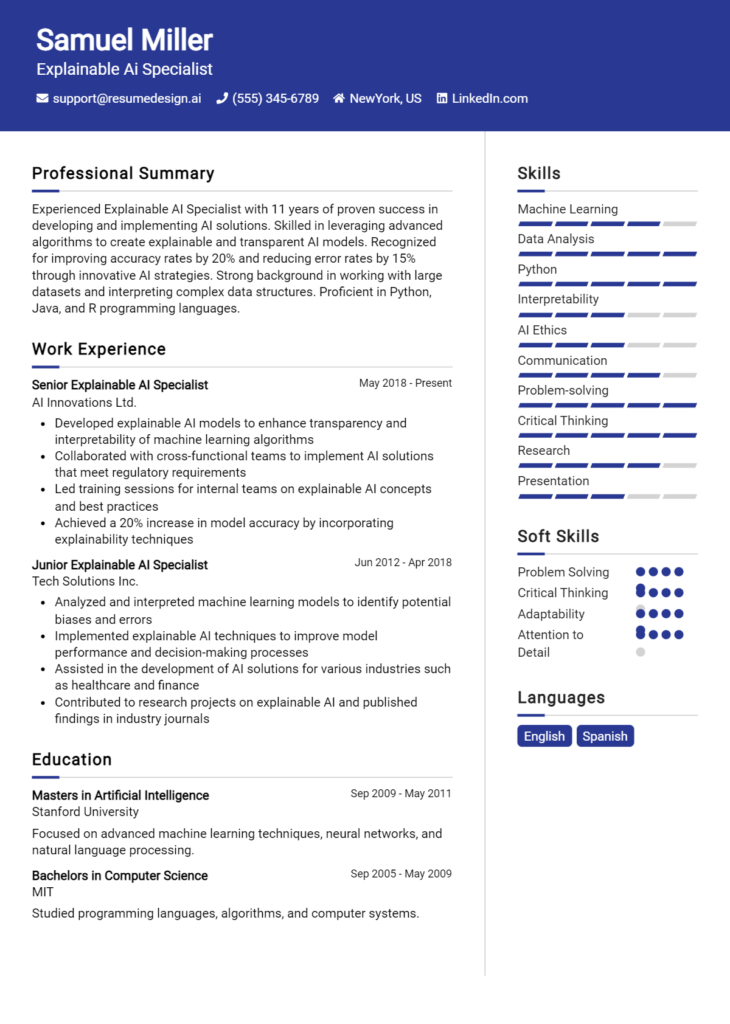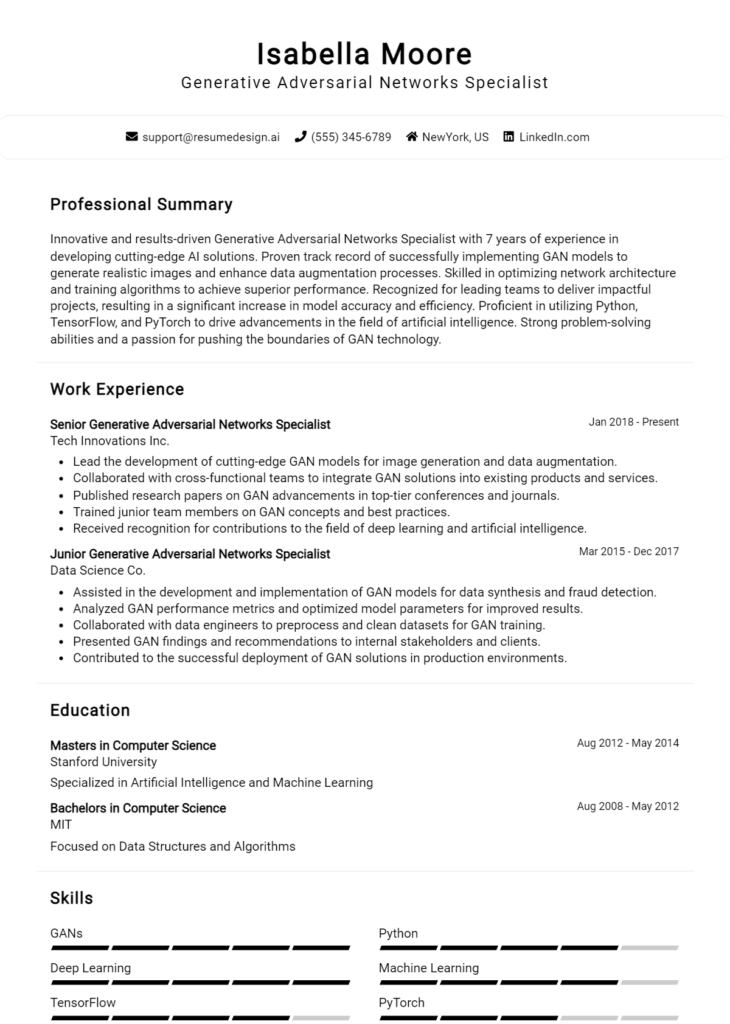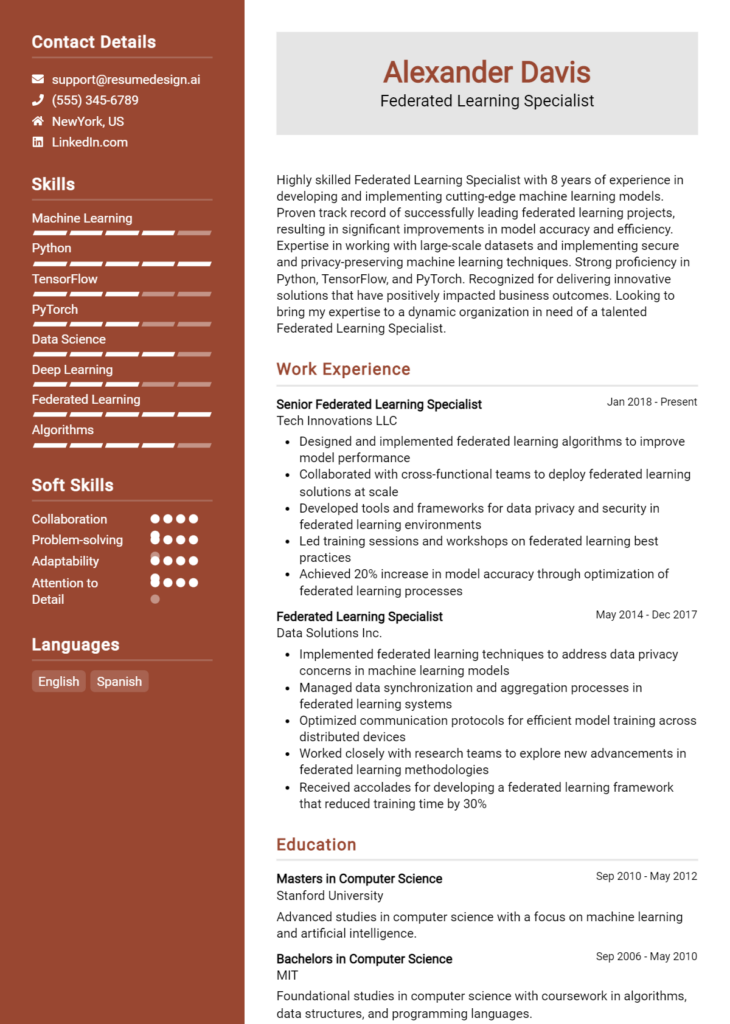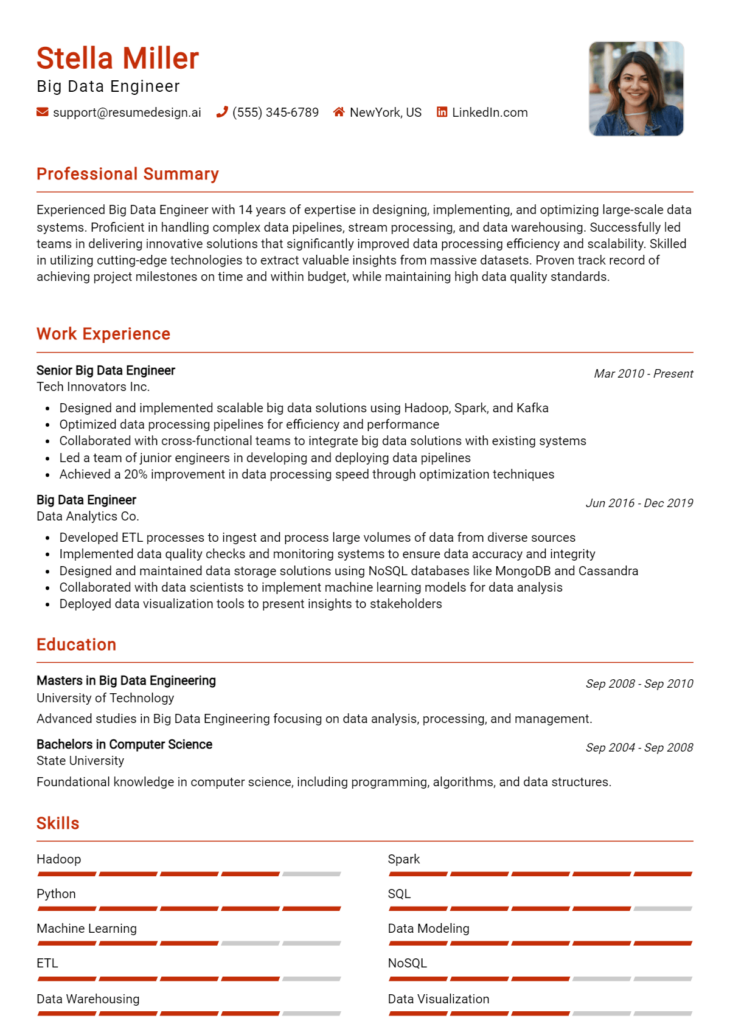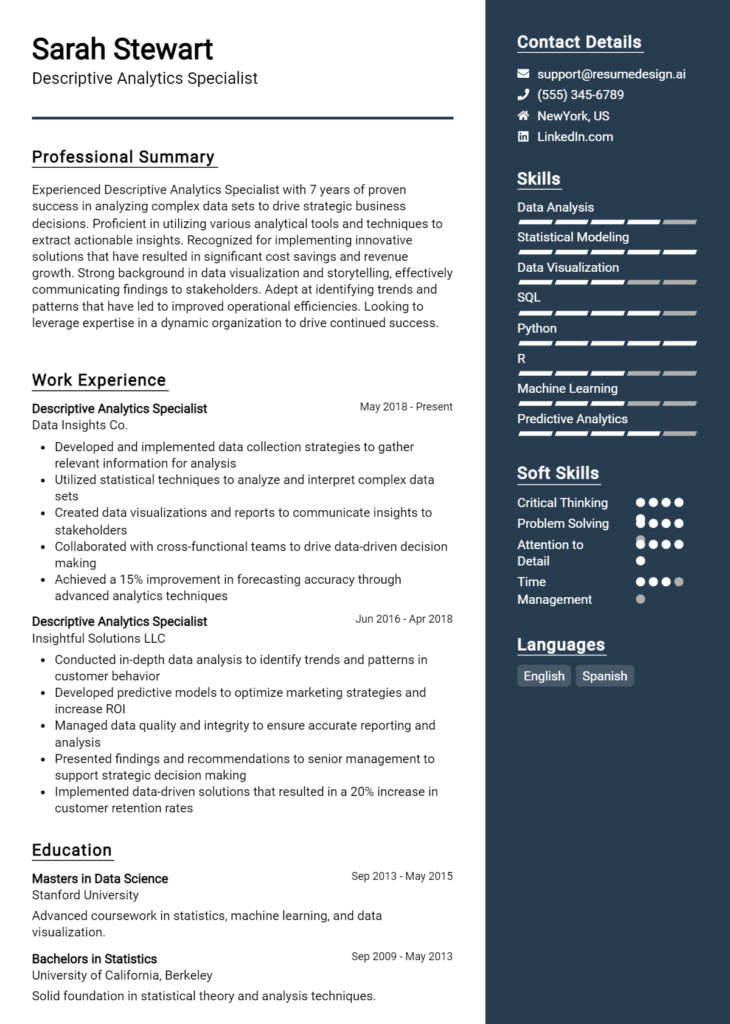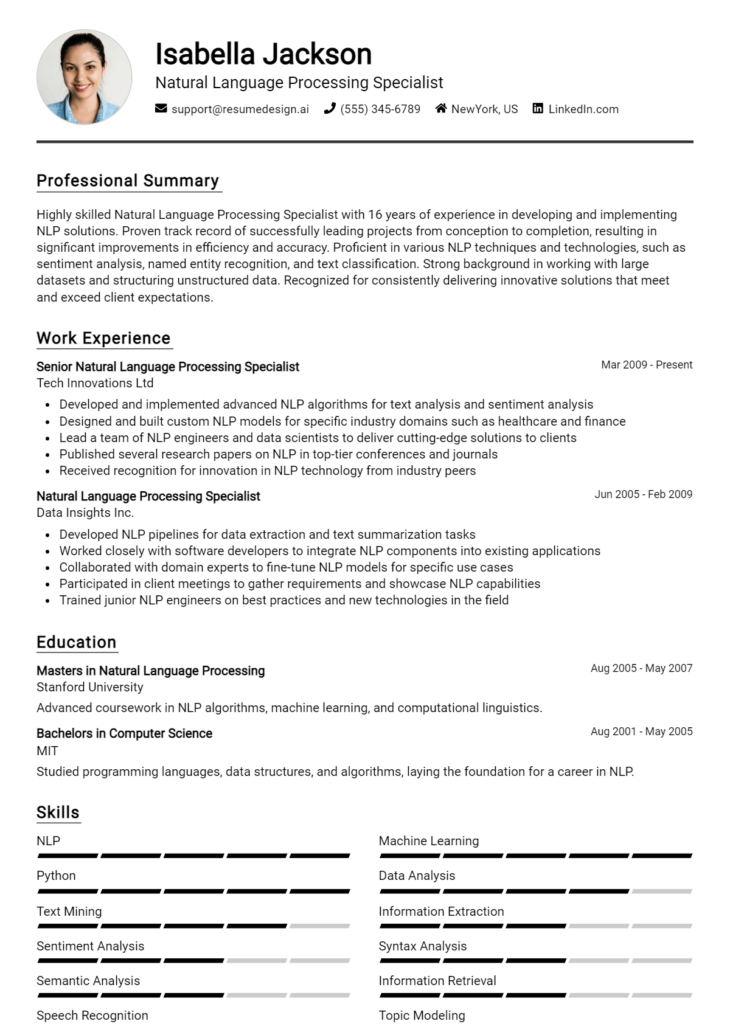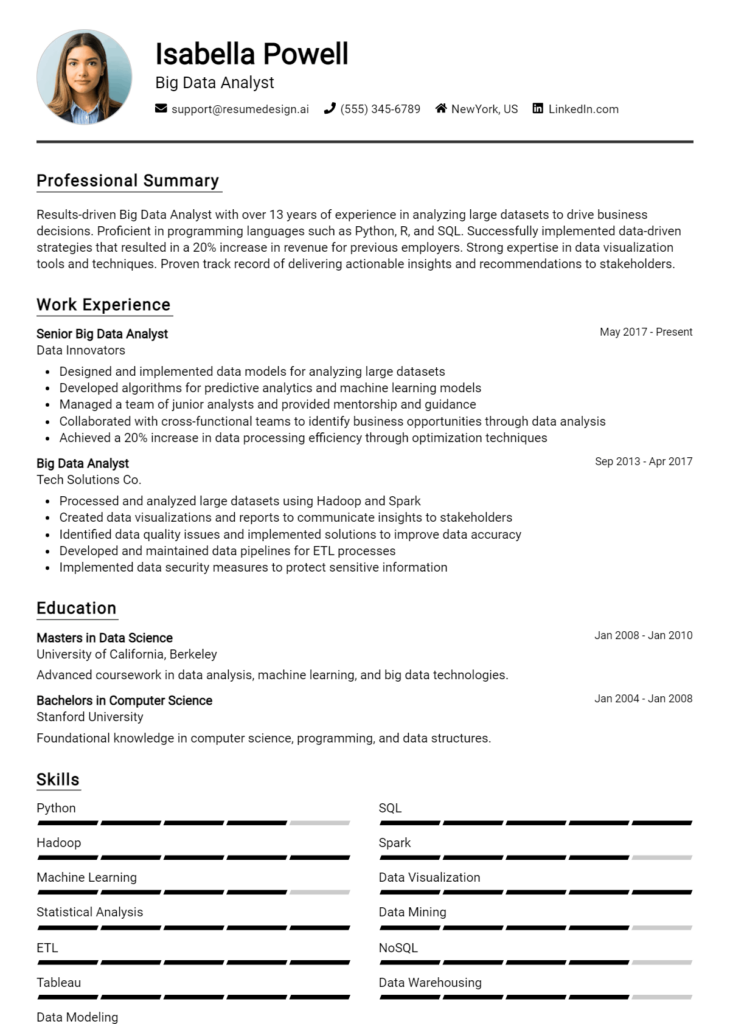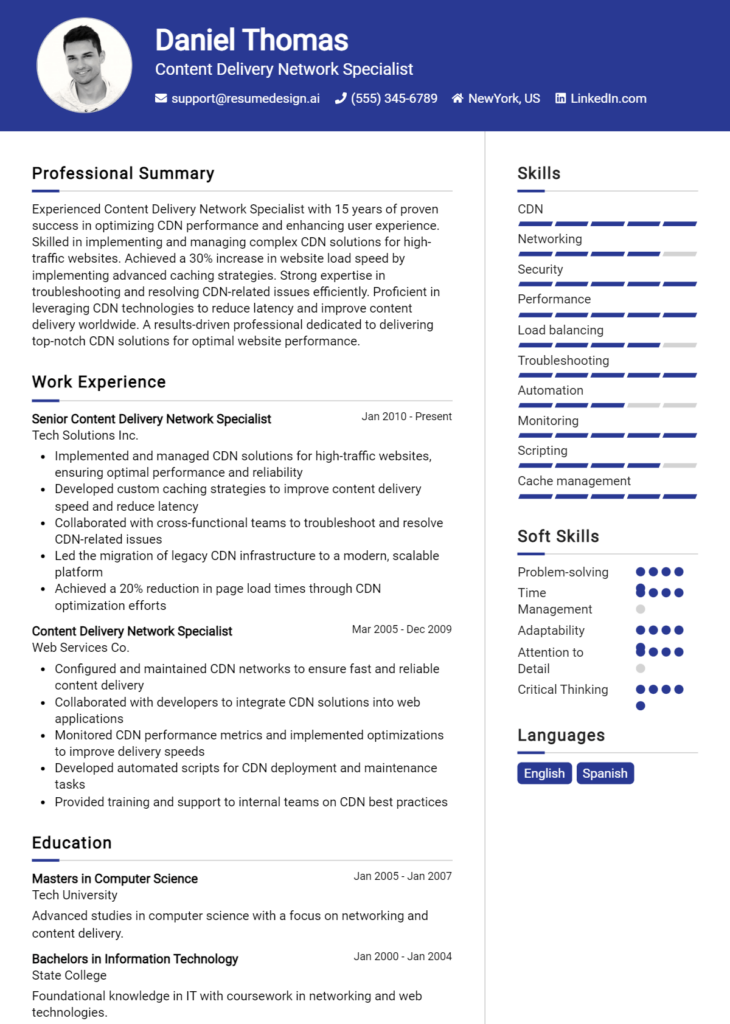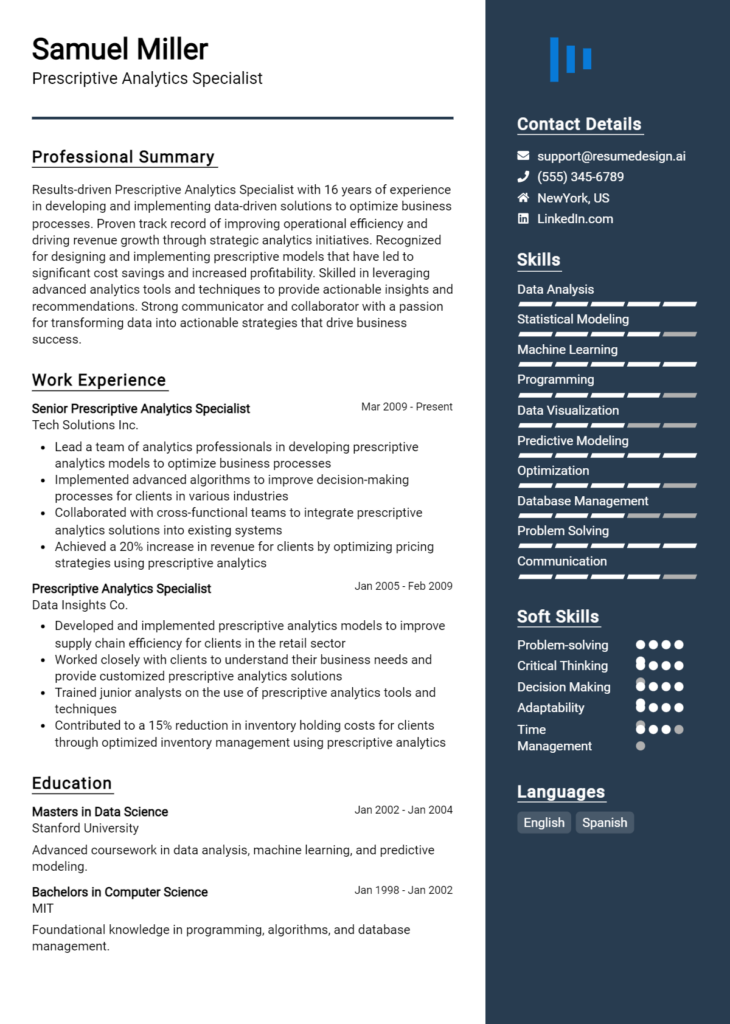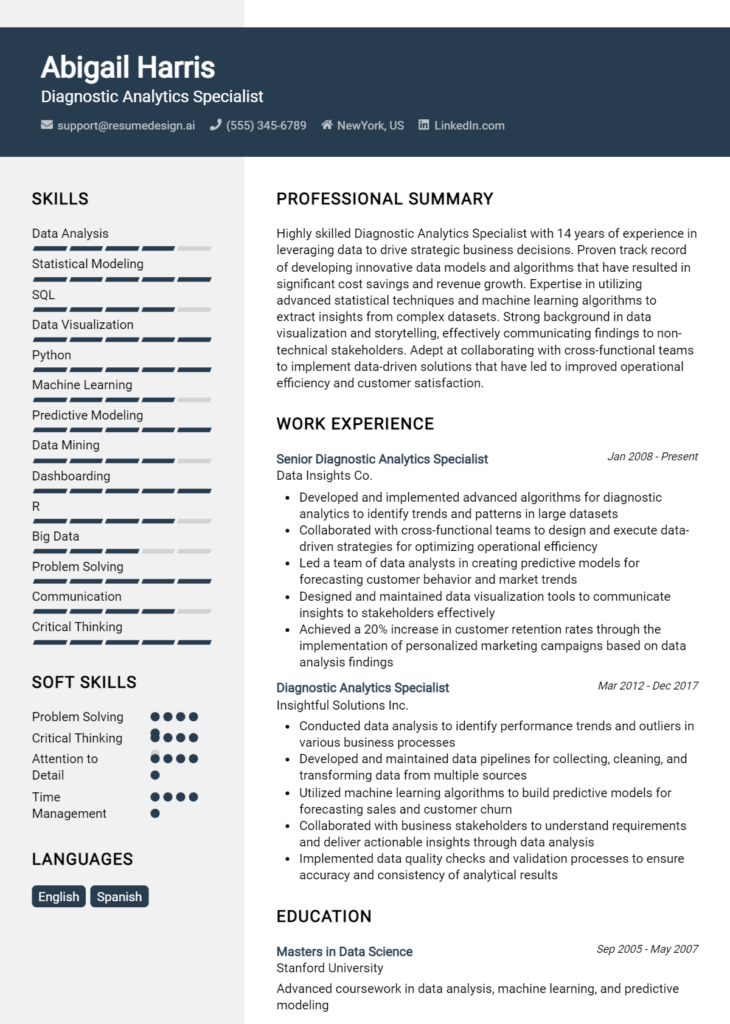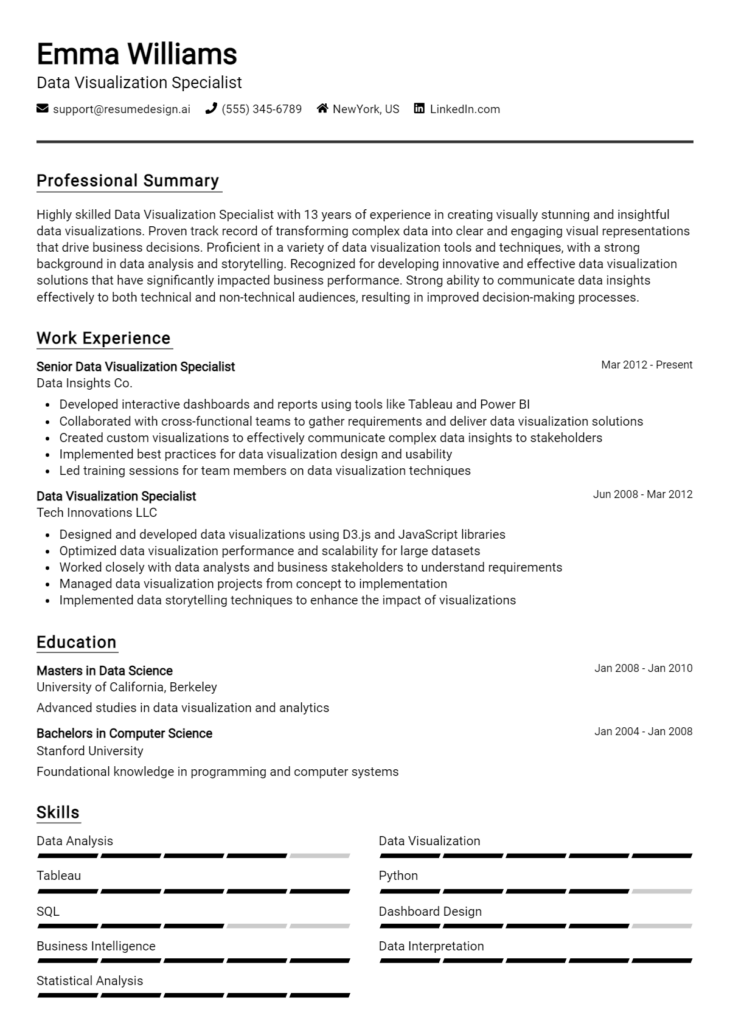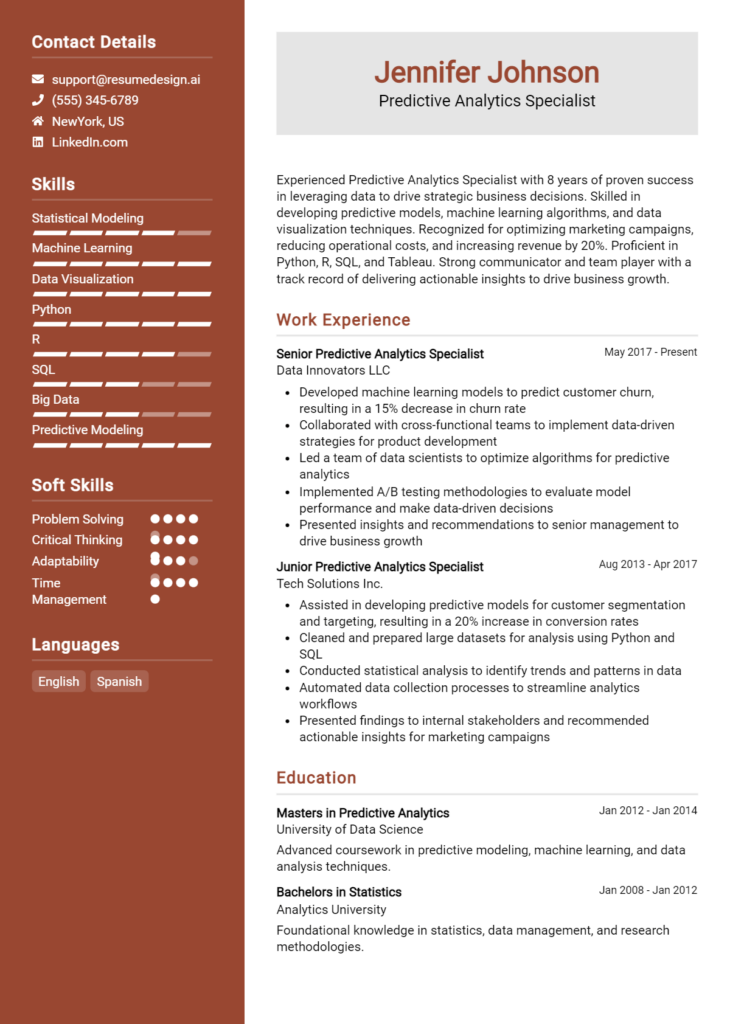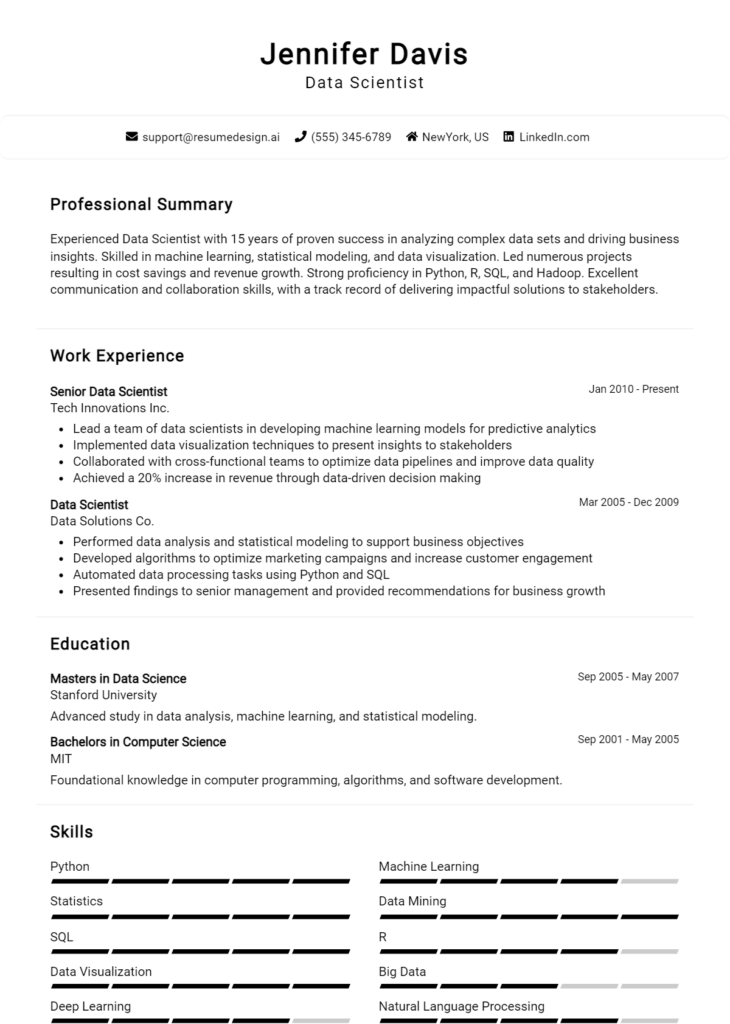Machine Learning Engineer Core Responsibilities
A Machine Learning Engineer plays a crucial role in developing algorithms and models that enable machines to learn from data. This position requires a blend of technical skills in programming, data analysis, and statistical modeling, alongside operational expertise to implement solutions across various departments. Strong problem-solving abilities are essential for identifying and addressing complex challenges. A well-structured resume highlighting these qualifications can effectively demonstrate the engineer's contribution to achieving the organization's overall objectives, facilitating collaboration across teams.
Common Responsibilities Listed on Machine Learning Engineer Resume
- Design and implement machine learning models and algorithms.
- Analyze and preprocess large datasets for training and testing.
- Collaborate with cross-functional teams to integrate ML solutions.
- Optimize model performance through hyperparameter tuning.
- Conduct experiments and validate model effectiveness.
- Document and communicate findings to stakeholders.
- Stay updated with the latest industry trends and technologies.
- Deploy machine learning models into production environments.
- Develop and maintain automated data pipelines.
- Ensure data quality and integrity throughout the ML lifecycle.
- Support decision-making by providing actionable insights from data.
High-Level Resume Tips for Machine Learning Engineer Professionals
In today's competitive job market, a well-crafted resume is essential for Machine Learning Engineer professionals looking to make a strong impression on potential employers. As the first point of contact between a candidate and a hiring manager, the resume serves as a showcase of skills, experience, and achievements that are crucial in the fast-evolving landscape of machine learning. A carefully tailored resume not only highlights technical proficiency but also conveys a candidate's unique contributions to past projects, making it imperative to present oneself effectively. This guide will provide practical and actionable resume tips specifically designed for Machine Learning Engineer professionals to enhance their job application prospects.
Top Resume Tips for Machine Learning Engineer Professionals
- Tailor your resume to match the job description by incorporating relevant keywords and phrases that align with the specific requirements of the role.
- Highlight your technical skills prominently, including programming languages (e.g., Python, R), machine learning frameworks (e.g., TensorFlow, PyTorch), and data manipulation tools (e.g., SQL, Pandas).
- Showcase relevant experience by detailing projects where you applied machine learning techniques, emphasizing your role and the technologies used.
- Quantify your achievements with metrics and data to provide concrete evidence of your contributions, such as improvements in model accuracy or reductions in computation time.
- Include a section for certifications and professional development, showcasing any relevant courses or credentials such as those from Coursera, edX, or industry-recognized certifications.
- Demonstrate your understanding of the domain by mentioning specific industries you have worked in (e.g., healthcare, finance) and the impact of your work.
- Utilize a clean and professional format that enhances readability, using bullet points for clarity and ensuring consistent font and spacing throughout.
- Incorporate a summary statement at the top of your resume that encapsulates your expertise, career goals, and what you bring to potential employers.
- Keep your resume concise, ideally one page, and focus on the most relevant information to maintain the hiring manager's attention.
By implementing these tips, Machine Learning Engineer professionals can significantly improve their resumes, increasing their chances of standing out in a crowded job market. A focused and well-structured resume not only highlights your qualifications but also demonstrates your professionalism and attention to detail, making you a more attractive candidate to potential employers.
Why Resume Headlines & Titles are Important for Machine Learning Engineer
In the competitive field of machine learning, a well-crafted resume headline or title is crucial for standing out among numerous applicants. A strong headline can immediately grab the attention of hiring managers, serving as a concise summary of a candidate's key qualifications and strengths. This impactful phrase should encapsulate the essence of the candidate's expertise while being relevant to the specific job being applied for. By effectively communicating core competencies and professional achievements in a few words, a compelling headline can significantly enhance the chances of a resume being noticed and read in detail.
Best Practices for Crafting Resume Headlines for Machine Learning Engineer
- Keep it concise: Aim for a headline that is clear and to the point, ideally no more than 10-15 words.
- Be role-specific: Tailor your headline to reflect the specific position you are applying for, highlighting relevant skills and experiences.
- Include key skills: Incorporate essential skills or technologies that are relevant to the job description.
- Highlight accomplishments: If possible, mention a significant achievement or contribution that showcases your expertise.
- Avoid jargon: Use clear and simple language that hiring managers can easily understand.
- Showcase your value: Communicate what unique value you bring to the role as a machine learning engineer.
- Use action-oriented language: Choose strong verbs that convey your proactive approach and capabilities.
- Be authentic: Ensure that your headline accurately reflects your professional identity and career goals.
Example Resume Headlines for Machine Learning Engineer
Strong Resume Headlines
"Innovative Machine Learning Engineer with 5+ Years of Experience in Predictive Analytics"
"Results-Driven Data Scientist Specializing in Deep Learning and Neural Networks"
"Expert in Machine Learning Algorithms with Proven Track Record in Natural Language Processing"
Weak Resume Headlines
“Machine Learning Engineer”
“Data Professional Seeking New Opportunities”
The strong headlines are effective because they provide specific insights into the candidate's expertise, skills, and achievements, immediately indicating their suitability for the role. In contrast, the weak headlines lack detail and context, making them generic and forgettable. By failing to convey any unique value or specialization, weak headlines do not capture the interest of hiring managers, resulting in missed opportunities for the candidates.
Writing an Exceptional Machine Learning Engineer Resume Summary
A well-crafted resume summary is crucial for a Machine Learning Engineer as it serves as the first impression on hiring managers. This brief but impactful paragraph succinctly highlights your key skills, experiences, and accomplishments that are directly relevant to the position you are applying for. A strong summary not only captures attention quickly but also sets the tone for the rest of your resume, making it essential to be concise, impactful, and tailored to align with the specific job description.
Best Practices for Writing a Machine Learning Engineer Resume Summary
- Quantify achievements: Use specific numbers and metrics to demonstrate your impact in previous roles.
- Focus on relevant skills: Highlight technical skills that align with the job description, such as programming languages, frameworks, and tools.
- Tailor the summary: Customize your summary for each application to reflect the specific requirements and keywords from the job posting.
- Use action verbs: Start sentences with strong action verbs to convey proactivity and effectiveness.
- Keep it concise: Aim for 3-5 sentences that encapsulate your value without overwhelming the reader.
- Showcase unique strengths: Highlight what sets you apart from other candidates, such as specialized knowledge or innovative projects.
- Include certifications: Mention relevant certifications that reinforce your expertise in machine learning and data science.
- Highlight collaborative experience: If applicable, indicate experience working in teams or cross-functional collaborations to enhance your profile.
Example Machine Learning Engineer Resume Summaries
Strong Resume Summaries
Results-driven Machine Learning Engineer with over 5 years of experience developing predictive models that increased sales forecasts by 25%. Proficient in Python, TensorFlow, and SQL, with a strong background in deep learning and natural language processing.
Detail-oriented Machine Learning Engineer skilled in designing and deploying machine learning algorithms, resulting in a 40% reduction in processing time for data analytics tasks. Holds a Master's degree in Computer Science and is certified in AWS Machine Learning.
Innovative Machine Learning Engineer with a proven track record of implementing AI solutions that improved customer engagement by 30%. Expert in data visualization tools and machine learning libraries, including Scikit-learn and Keras.
Weak Resume Summaries
Machine Learning Engineer with some experience in the field. I have worked on various projects and have skills in programming.
Enthusiastic professional looking for a role in machine learning. I have a background in technology and enjoy working with data.
The examples provided illustrate the differences between strong and weak resume summaries. Strong summaries contain specific, quantifiable achievements and relevant skills tailored to the job, making them impactful and memorable. In contrast, weak summaries are vague, lack detail, and do not effectively convey the candidate's qualifications or unique value, likely leading to a missed opportunity in the hiring process.
Work Experience Section for Machine Learning Engineer Resume
The work experience section in a Machine Learning Engineer resume is critical as it serves as a testament to the candidate's technical skills, project management capabilities, and ability to deliver high-quality products. This section not only highlights the tools and technologies the candidate is proficient in but also demonstrates their success in implementing machine learning solutions and collaborating with diverse teams. By quantifying achievements and aligning their experience with industry standards, candidates can effectively showcase their value to potential employers, making it easier for hiring managers to gauge their impact in previous roles.
Best Practices for Machine Learning Engineer Work Experience
- Focus on quantifiable results: Use metrics to showcase the impact of your work, such as improved model accuracy or reduced processing time.
- Highlight technical expertise: Clearly list relevant technologies, programming languages, and frameworks you have worked with.
- Emphasize collaboration: Describe your role in team projects and how you contributed to collective goals.
- Detail project outcomes: Explain the significance of the projects you've worked on and how they benefited the organization.
- Use action verbs: Start bullet points with strong action verbs to convey a sense of initiative and impact.
- Align with industry standards: Tailor your experience to reflect the skills and competencies that are currently in demand in the field of machine learning.
- Keep it concise: Limit each bullet point to a single idea and aim for clarity without unnecessary jargon.
- Regularly update your experience: As you gain new skills and complete projects, ensure your work experience section remains current.
Example Work Experiences for Machine Learning Engineer
Strong Experiences
- Developed a predictive maintenance model that reduced equipment downtime by 30%, leading to a cost savings of $200,000 annually.
- Led a team of 5 engineers to build a real-time fraud detection system, achieving a 95% accuracy rate and processing over 1 million transactions per day.
- Implemented a natural language processing algorithm that improved customer sentiment analysis by 40%, directly enhancing marketing strategies.
- Collaborated with cross-functional teams to deploy a machine learning model that personalized user recommendations, increasing engagement by 25%.
Weak Experiences
- Worked on machine learning projects that were interesting and involved various tasks.
- Assisted in developing models for different applications without specifying the outcomes.
- Participated in team meetings to discuss project ideas and strategies.
- Contributed to software development without detailing specific technologies or results.
The examples of strong experiences are characterized by specific, quantifiable outcomes and clear demonstrations of technical leadership and collaboration. They provide concrete evidence of the candidate's contributions and the value they brought to their previous roles. In contrast, the weak experiences lack detail and measurable results, making it difficult for potential employers to understand the candidate's impact and capabilities. Strong experiences communicate effectiveness, while weak experiences leave questions about the candidate's qualifications and achievements.
Education and Certifications Section for Machine Learning Engineer Resume
The education and certifications section of a Machine Learning Engineer resume is crucial as it highlights the candidate's academic background, industry-relevant certifications, and commitment to continuous learning. In a rapidly evolving field like machine learning, showcasing relevant coursework, specialized training, and recognized credentials can significantly enhance a candidate's credibility and demonstrate alignment with the job requirements. Employers seek candidates who not only possess theoretical knowledge but also practical skills applicable to current industry standards, making this section a vital aspect of the resume.
Best Practices for Machine Learning Engineer Education and Certifications
- Include only relevant degrees and certifications that pertain to machine learning, data science, or computer science.
- Highlight advanced degrees (Master's or Ph.D.) in relevant fields to demonstrate expertise.
- List industry-recognized certifications from reputable organizations, such as AWS, Google, or Microsoft.
- Incorporate relevant coursework that directly relates to machine learning algorithms, data analysis, and programming.
- Detail any specialized training or boot camps that focus on machine learning technologies and tools.
- Use specific dates to indicate when degrees and certifications were obtained to showcase the most current qualifications.
- Consider adding a brief description of key projects or skills gained during coursework or training.
- Avoid cluttering the section with irrelevant qualifications or outdated certifications.
Example Education and Certifications for Machine Learning Engineer
Strong Examples
- M.S. in Computer Science - University of California, Berkeley (Graduated May 2023)
- Certified TensorFlow Developer - TensorFlow Certificate Program (Issued June 2022)
- Relevant Coursework: Machine Learning, Deep Learning, Data Mining, and Statistical Analysis
- Professional Certificate in Data Science - Harvard University (Completed August 2021)
Weak Examples
- Bachelor of Arts in Philosophy - University of Southern California (Graduated May 2010)
- Certification in Basic Computer Skills - Online Learning Platform (Issued January 2015)
- Coursework: Introduction to Psychology, World History, and English Literature
- Outdated Certification in Microsoft Office Suite - (Issued March 2010)
The strong examples are considered robust because they directly relate to the field of machine learning, featuring advanced degrees and certifications from reputable institutions that demonstrate the candidate's technical skills and knowledge. In contrast, the weak examples highlight irrelevant educational backgrounds and outdated certifications that do not align with the current demands of the machine learning industry, which could detract from the candidate's overall qualifications.
Top Skills & Keywords for Machine Learning Engineer Resume
In the competitive landscape of machine learning, possessing the right skills is crucial for standing out as a candidate. A well-crafted resume that highlights both hard and soft skills can significantly enhance a Machine Learning Engineer's chances of landing an interview. Employers are not only looking for technical prowess but also for candidates who can collaborate effectively, communicate complex ideas, and adapt to rapidly changing technology. By showcasing a balanced mix of skills in your resume, you can present a comprehensive picture of your qualifications and readiness for the challenges of this dynamic field.
Top Hard & Soft Skills for Machine Learning Engineer
Soft Skills
- Problem-Solving
- Communication Skills
- Team Collaboration
- Critical Thinking
- Adaptability
- Time Management
- Creativity
- Attention to Detail
- Curiosity
- Leadership
Hard Skills
- Proficiency in Python and R
- Machine Learning Algorithms (e.g., regression, classification)
- Data Wrangling and Preprocessing
- Experience with TensorFlow and PyTorch
- Statistical Analysis
- Data Visualization Tools (e.g., Matplotlib, Seaborn)
- Big Data Technologies (e.g., Hadoop, Spark)
- Knowledge of SQL and NoSQL Databases
- Model Deployment Techniques
- Cloud Platforms (e.g., AWS, Azure)
Including a robust set of both soft and hard skills in your resume can greatly improve your appeal to potential employers. Additionally, it's essential to emphasize relevant work experience to support your skills and demonstrate your ability to apply them in real-world situations.
Stand Out with a Winning Machine Learning Engineer Cover Letter
Dear [Hiring Manager's Name],
I am excited to apply for the Machine Learning Engineer position at [Company Name], as advertised on [where you found the job listing]. With a strong foundation in machine learning algorithms, data analysis, and software development, I am eager to contribute my skills to your innovative team. My experience in building predictive models and deploying machine learning solutions aligns well with your company's commitment to leveraging data-driven approaches for impactful results.
In my previous role at [Previous Company Name], I successfully led a project that involved developing a recommendation system that improved user engagement by 20%. I utilized advanced techniques such as collaborative filtering and deep learning, which not only enhanced the user experience but also optimized our marketing strategies. My proficiency in programming languages such as Python and R, combined with my experience using frameworks like TensorFlow and PyTorch, allows me to create robust machine learning solutions tailored to specific business needs.
I am particularly drawn to [Company Name] due to its focus on [specific aspect of the company or project that excites you]. I am impressed by your commitment to innovation and the use of cutting-edge technology to solve complex problems. I am confident that my analytical mindset, coupled with my passion for continuous learning in the rapidly-evolving field of machine learning, would make me a valuable asset to your team.
I look forward to the opportunity to discuss how my background, skills, and enthusiasms align with the goals of [Company Name]. Thank you for considering my application. I hope to bring my expertise in machine learning to contribute to your team’s success.
Sincerely,
[Your Name]
[Your LinkedIn Profile or Personal Website]
[Your Contact Information]
Common Mistakes to Avoid in a Machine Learning Engineer Resume
When crafting a resume for a Machine Learning Engineer position, it’s essential to present your skills and experience in a clear and compelling manner. However, many candidates often make common mistakes that can hinder their chances of landing an interview. By avoiding these pitfalls, you can create a more effective resume that highlights your qualifications and sets you apart from the competition.
Lack of Tailoring: Failing to customize your resume for specific job descriptions can result in a generic document that doesn't resonate with employers. Always align your skills and experiences with the requirements of the job.
Overly Technical Jargon: While technical skills are crucial, using excessive jargon or complex terminology can alienate hiring managers who may not have a deep understanding of machine learning concepts. Aim for clarity and simplicity.
Neglecting Soft Skills: Focusing solely on technical abilities and ignoring soft skills like communication, teamwork, and problem-solving can give an incomplete picture. Employers often seek well-rounded candidates who can collaborate effectively.
Inadequate Project Descriptions: Listing projects without providing context or impact can diminish their significance. Include details about your role, the technologies used, and the outcomes achieved to showcase your contributions effectively.
Ignoring Data-Driven Achievements: Failing to quantify your accomplishments can make your resume less compelling. Use metrics to highlight your contributions, such as improvements in model accuracy, reductions in processing time, or increased efficiency.
Poor Formatting: A cluttered or unprofessional layout can distract from your qualifications. Ensure your resume is well-organized, easy to read, and visually appealing to create a positive first impression.
Including Irrelevant Experience: Listing unrelated job experiences can dilute the focus of your resume. Prioritize relevant roles and skills that directly relate to machine learning and data science to strengthen your application.
Spelling and Grammar Errors: Typos and grammatical mistakes can undermine your professionalism and attention to detail. Always proofread your resume multiple times and consider using tools to catch any errors before submission.
Conclusion
In conclusion, becoming a successful Machine Learning Engineer requires a blend of technical skills, practical experience, and effective communication abilities. It's essential to continuously update your knowledge in areas such as algorithm development, data processing, and model evaluation, as the field is constantly evolving. Additionally, soft skills like teamwork and problem-solving are vital for collaborating on complex projects.
As you reflect on your career and the skills that make you an ideal candidate for this role, take the time to review and enhance your Machine Learning Engineer resume. Make sure to highlight your relevant experience, projects, and accomplishments that demonstrate your expertise in machine learning.
To assist you in this process, consider utilizing available tools such as resume templates, which can help you create a polished and professional resume layout. You might also explore the resume builder for a user-friendly way to craft your resume. Looking for inspiration? Check out the resume examples to see how others have successfully showcased their skills. Lastly, don't forget to complement your resume with an impactful cover letter using our cover letter templates.
Take action today to ensure your resume stands out in the competitive field of machine learning!

